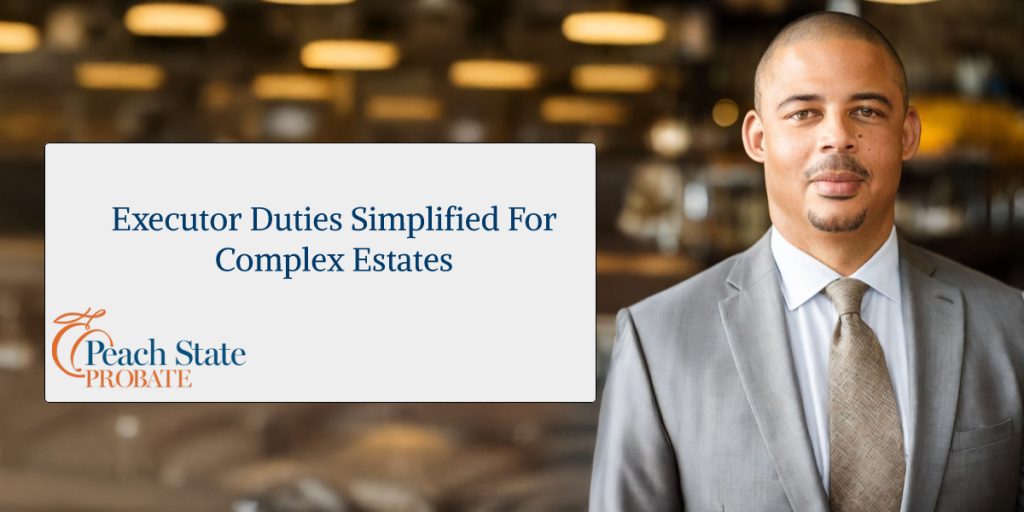## Understanding Executor Duties in the Context of Complex Estates
When dealing with complex estates, the role of the executor becomes paramount. Executor duties encompass a wide array of responsibilities that ensure the deceased’s estate is administered according to the law and the wishes of the deceased. Handling such responsibilities becomes even more intricate when navigating complex assets, multiple beneficiaries, or contentious family dynamics. An executor must be organized, detail-oriented, and capable of problem-solving in high-pressure situations.
In many cases, complex estates involve a variety of assets, such as real estate, investments, and intellectual property. Each asset may require specialized knowledge for effective management and final distribution to heirs. An executor must be familiar with the legal requirements surrounding these varied assets, ensuring proper valuation and that all necessary taxes are filed and paid. Failing to adhere to these duties can lead to disputes among beneficiaries or even potential legal ramifications.
Ultimately, understanding executor duties in complex estates is crucial for successful administration. This understanding not only helps preserve the value of the estate but also ensures a smoother process for beneficiaries, minimizing potential conflicts and misunderstandings.
## Clarifying What Executor Duties Entail
Executor duties refer to the legal responsibilities attributed to a person appointed to administer a deceased person’s estate. These duties begin with gathering and securing the deceased’s assets and advocating for the estate’s proper management throughout the probate process. From inventorying property to settling debts and distributing assets, each step is guided by both state law and the wishes outlined in the deceased’s will.
Among the initial executor duties is filing the will with the probate court and officially petitioning for appointment as executor, which gives the authority to act on behalf of the estate. This duty also includes notifying beneficiaries, creditors, and relevant parties about the probate proceedings.
Moreover, executors are tasked with creating an accounting of the estate, which involves documenting all incoming and outgoing transactions. This transparency ensures that all beneficiaries understand the estate’s financial standing and confirms that the executor is fulfilling their obligations per legal and fiduciary standards.
## Importance of Understanding Executor Duties
Understanding the intricacies of executor duties is essential not only for the appointed individuals but also for families navigating the loss of a loved one. The administration of an estate has significant emotional stakes and financial implications, making it critical for executors to be well-informed. When executors understand their responsibilities fully, they can avoid pitfalls that may lead to delays, disputes, or even legal complications.
The complexity of estate management is often amplified by the presence of multiple beneficiaries with varying expectations. An informed executor is better equipped to navigate these dynamics by fostering clear communication, setting realistic timelines, and fulfilling fiduciary duties diligently. Transparency can dramatically reduce conflicts among beneficiaries, which is vital for maintaining familial relationships during difficult times.
In addition, understanding these duties allows for better risk management. Executors who recognize red flags and potential issues earlier in the process can consult with legal and financial advisors proactively, ensuring that the estate is protected against liability and that beneficiaries’ interests are safeguarded.
## The Legal Framework of Executor Duties in Complex Estates
Georgia law outlines specific regulations regarding executor duties that govern the probate process. An executor must adhere to these legal standards to ensure compliance and protect against any potential liability. The Uniform Probate Code provides a foundational understanding of executor responsibilities, emphasizing the importance of executing the deceased’s wishes while adhering to state laws.
In addition to state mandates, federal regulations regarding taxes may impact executor duties when dealing with larger estates. Executors must ensure that any required federal estate tax returns are filed and that the applicable taxes are paid. This adds complexity to the administrative process, requiring knowledge of tax implications related to asset transfers and potential gains.
Another critical aspect of the legal context involves the protection of beneficiaries’ interests. Executors have a fiduciary duty to act in the best interest of the estate and its heirs. This duty obligates them to avoid self-dealing, ensure fair treatment of all parties, and provide transparent accounting throughout the probate process.
## Real-World Applications of Executor Duties
Understanding executor duties is further illuminated through real-world applications that highlight the challenges faced by executors managing complex estates. For instance, consider an estate with several properties, stocks, and personal belongings, where beneficiaries have differing opinions on asset distribution. The executor must balance these interests while ensuring that the estate is managed efficiently and accurately.
Take, for example, a scenario involving a family-owned business that has been passed down through generations. The executor, in this case, would not only have to address the financial aspect of the estate but also navigate interpersonal dynamics among family members. Resolving these complexities and facilitating discussions can be one of the most challenging yet essential executor duties.
Furthermore, situations may arise where assets are located in different jurisdictions or subject to varying laws and procedures, complicating the executor’s role. Executors must be diligent in understanding diverse legal requirements or must seek guidance on these matters to ensure compliance. Real-world cases underscore the importance of an informed and proactive approach when carrying out executor duties, as the nuances can significantly influence outcomes.
## Practical Steps for Executing Duties Effectively
To execute their responsibilities effectively, an executor should follow a series of structured steps. First, an organized approach allows the executor to verify the will, gather essential documents like death certificates, and file necessary forms with the probate court promptly. This groundwork sets the stage for a smoother process moving forward, as timely filings can avoid delay in the probate process.
Next, creating a comprehensive inventory of the deceased’s assets is paramount. This step includes identifying all tangible and intangible assets and determining their value, which is essential for both transparency and tax implications. Maintaining meticulous records not only aids the executor but also serves as an informative resource for beneficiaries.
Beyond initial paperwork and inventory, open communication is vital. Executors should regularly update beneficiaries about estate progress and any potential issues. This communication builds trust and helps mitigate conflict while keeping beneficiaries informed about what to expect during the probate process. By adopting these practical steps, executors can navigate their duties with clarity and assurance.
## Avoiding Common Pitfalls in Executor Duties
Despite good intentions, many executors encounter common mistakes that can lead to complications or disputes. One significant pitfall is neglecting to communicate effectively with beneficiaries. Lack of transparency regarding the status of the estate can breed mistrust and dissatisfaction, potentially leading to conflicts that could have been easily resolved through consistent updates.
Another common issue arises from improper management of assets. Executors may inadvertently mismanage property, fail to maintain appropriate insurance coverage, or mishandle investments. Effective asset management is crucial, not just for preserving the estate’s value, but also for fulfilling fiduciary duties. Engaging with professionals or advisors in finance and real estate can greatly reduce the risk of financial loss.
Additionally, failing to recognize and settle debts can become a significant oversight. Executors must be diligent in identifying outstanding obligations of the deceased and ensuring that these debts are settled before distribution to beneficiaries. This responsibility requires careful attention to detail and a thorough understanding of both state laws and the deceased’s financial affairs.
## Knowing When to Consult an Attorney
Consulting an attorney is often beneficial, if not essential, when navigating the complexities of executor duties. Executors should recognize that while they may have a grasp of their responsibilities, the intricacies of probate laws can become overwhelming. Engaging an attorney ensures that one is well-informed about the legal implications of their actions and aware of any updates in the law.
In particular, if disputes arise among beneficiaries, legal representation can guide the executor through mediation or litigation processes, protecting the executor from personal liability while promoting a fair resolution. Navigating family disputes can be emotionally charged and legally complex, making professional guidance invaluable.
Additionally, complexities surrounding tax implications and asset management may necessitate legal support. Tax laws can change frequently and differ regionally, making it crucial for an executor to rely on an attorney who can provide current information and help navigate these obligations effectively.
## Advantages of Legal Representation for Executors
Legal representation offers several advantages for executors handling complex estates. An attorney can provide clarity on confusion surrounding the probate process and offer sound strategies for effectively managing executor duties. This legal oversight can prevent costly mistakes that may arise from misunderstanding requirements or failing to meet deadlines.
In addition, legal representation can facilitate communication with beneficiaries, ensuring that any concerns are addressed promptly. An attorney can serve as a neutral third party, helping to diffuse tensions if disputes arise, fostering a collaborative environment conducive to resolving differences amicably.
Furthermore, attorneys specializing in probate matters can assist with proper documentation and filing processes, ensuring compliance with legal requirements. This support is especially useful when navigating complicated assets or tax implications that may impact the estate, allowing the executor to focus on fulfilling their duties with more confidence.
## How Peach State Probate Supports Executors in Complex Estates
Peach State Probate stands out as a premier choice for those navigating executor duties in complex estates across Georgia. With a deep understanding of probate law and a commitment to client-centered service, they offer invaluable assistance throughout the entire probate process. Their expertise simplifies the myriad challenges faced by executors, ensuring that duties are discharged efficiently and in accordance with legal standards.
Their comprehensive services encompass guidance on asset identification, debt resolution, and efficient communication with beneficiaries. Recognizing the sensitive nature of estate administration, their approach emphasizes transparency and collaboration, seeking to minimize conflict and ensure that all parties feel valued and heard.
Moreover, Peach State Probate is adept at addressing the diverse complexities that may arise in estate administration—from tax issues to family disputes. Their tailored legal strategies provide executors with the reassurance of both compliance and informed decision-making, ultimately helping to promote a smoother probate experience for all involved. Understand the key duties of an executor in probate proceedings. Our resources provide valuable insights into fulfilling executor responsibilities effectively.




